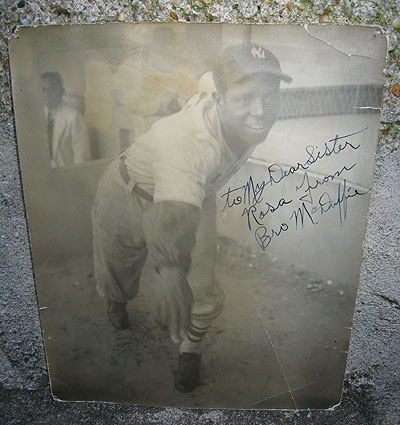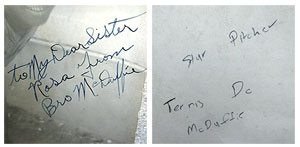When I first saw the NY ballplayer’s photo on a tray at auction recently, I was hoping he was a Negro Leaguer. I have a black-and-white group photo of black players in the 1924 Colored World Series, but not a photo of a single player.
On the front was a message handwritten in ink:
To My Dear Sister Rosa From Bro McDuffie
I flipped the photo on the back and found more: Star Pitcher Terris Dc McDuffie.
I Googled Terris McDuffie on my Droid and up popped his name as a pitcher in the Negro Leagues. I had a winner. I knew that I had to have that photo. (Click photo above to see the full picture.)
It was among a lot of five on a tray, along with a 1975 Elvis Christmas eight-track tape and four 45 rpms (including a record by country singer Lonnie Lynne LaCour for the Rhinestone Rooster label.)
The other photos were of a naval officer in uniform with the name “Hicks” on the back, while another looked to be a retouched, doctored and colorized photo of a little boy standing near a delivery truck with the name Hicks on the side. The truck’s door had what appeared to be a New York address. On the back of the photo was written: “Pastel. Remove automobile, remove hand from shoulder.”

I assumed the lot had belonged to McDuffie’s sister, because there was a second photo autographed to her in fountain pen: “To ‘Rose’ May you always have the Best of Everything. Always, Your Friend Vivian.” Vivian had written the year 1949 at the bottom of the photo.
The prize among the stash was obviously McDuffie’s photo, which appeared to be a bit out of focus. He was shown in a just-threw-a-ball pitching stance, likely for the photographer, who was not identified.
Terris McDuffie was born in the early 1900s (I found three different birth years: 1902, 1910 and 1920) in Mobile, AL. In 1929 while stationed at Fort Benning, GA, he played for the Army’s segregated 24th Infantry Regiment, which faced pitcher Satchel Paige and the Birmingham Black Barons in games.
McDuffie, a right-hander, started in the outfield with the Birmingham Black Barons in 1930, but wound up on the pitcher’s mound two years later, where he would excel. During his 20-year career, he also played for such teams as the Baltimore Black Sox, Pennsylvania Red Caps, New York Black Yankees, Newark Eagles, Homestead Grays, Cuban Stars and the Philadelphia Stars.
He played in the Cuban Winter League, and the Mexican, Puerto Rican, Dominican and Venezuelan Leagues.
 In the 1941 East-West All Star Game of the Negro Leagues, McDuffie – known as “Elmer the Great,” “Speed” and “Terris the Terrible” – was the winning pitcher. Here’s what Wilmer “Red” Fields, a Negro League player who was formerly president of the Negro Leagues Players Association, had to say about McDuffie back in 1998:
In the 1941 East-West All Star Game of the Negro Leagues, McDuffie – known as “Elmer the Great,” “Speed” and “Terris the Terrible” – was the winning pitcher. Here’s what Wilmer “Red” Fields, a Negro League player who was formerly president of the Negro Leagues Players Association, had to say about McDuffie back in 1998:
“He was a good pitcher. I have to give him credit,” Fields said in a reprint of the 1998 book “Voices From the Negro Leagues.” ‘He had the stuff to throw, too – fastball, slider, curveball. Knew how to pitch.”
McDuffie’s off-field antics were as storied as his play on the field. He was said to have a penchant for gold watches, flashy clothes and diamond rings. He was linked to Effa Manley, who with her husband owned the Newark Eagles, for whom McDuffie played. She managed the team with her husband while he was alive and kept it afloat after he died. One Effa Manley story involving McDuffie was repeated often on the web: She wanted him to pitch a certain game so she could show him off to her girlfriends.
Around 1938, McDuffie was traded by Manley’s husband, Abe, to the New York Black Yankees. I assume that the auction photo was taken around that time, from the late 1930s to early 1940s, after he joined the New York team.
In 1945, McDuffie and Dave “Showboat” Thomas showed up for a tryout for Branch Rickey’s Brooklyn Dodgers. Rickey was trying to find a way to integrate America’s pastime; so, feeling pressured by black sportswriter Joe Bostic, he gave the two a tryout. They were summarily turned down (by then both were nearing the end of their careers), and Rickey went on to sign Jackie Robinson.
By 1962, McDuffie was driving a taxi cab in New York, according to a blurb in Jet magazine, hoping for a scouting job with the Mets. He died in 1968.
As for the photos, I wasn’t the only one who wanted them. I went tit-for-tat with an auction-house regular, finally beating him out at $30. Another auction-goer asked me later what was so valuable on the tray that pushed up the price.
He wouldn’t understand.


Excellent work, Ms. Howard! Terris McDuffie was my father. I have run into a brick wall trying to find information about his personal life.